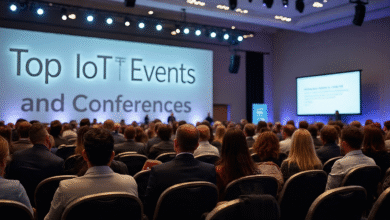The Rise of IoT Startups in Germany: Trends, Challenges & Success Stories

Germany has long been a powerhouse in engineering and manufacturing. Today, it is rapidly emerging as a major hub for the Internet of Things (IoT) innovation. The rise of IoT startups in Germany is reshaping industries, creating smarter cities, and revolutionizing the way businesses operate. In this article, we will dive deep into the trends driving this transformation, the challenges these startups face, and inspiring success stories that highlight Germany’s vibrant IoT ecosystem.
Understanding the Rise of IoT Startups in Germany
The rise of IoT startups in Germany is no accident. With strong government support, an abundance of research institutions, and a culture that embraces engineering excellence, Germany offers a fertile ground for IoT innovation. IoT technology connects devices and systems to the internet, allowing real-time data collection, monitoring, and decision-making — a perfect fit for Germany’s industrial prowess.
Additionally, initiatives like “Industrie 4.0,” launched by the German government, have accelerated the digital transformation of manufacturing and related sectors. As a result, many entrepreneurs are seizing opportunities to launch IoT startups that cater to various sectors such as manufacturing, healthcare, energy, automotive, and smart cities.
Key Trends Fueling the Rise of IoT Startups in Germany
1. Industry 4.0 and Smart Manufacturing
Germany’s manufacturing sector is deeply intertwined with the “Industry 4.0” movement. Startups are developing IoT solutions that enhance production efficiency, predictive maintenance, and supply chain management. By using IoT sensors and AI algorithms, companies can monitor machine health, reduce downtime, and optimize production.
2. Smart Cities Initiatives
Cities like Berlin, Hamburg, and Munich are leading the way in adopting smart city technologies. Startups are introducing IoT-powered solutions for traffic management, waste reduction, energy efficiency, and public safety. These initiatives are improving urban living standards while opening up vast business opportunities for IoT companies.
3. Healthcare and MedTech Innovations
German startups are using IoT technologies to revolutionize healthcare. Wearable devices, remote patient monitoring, and smart hospital management systems are gaining traction. Especially post-pandemic, the demand for remote healthcare solutions has soared.
4. Green Energy and Sustainability
The focus on sustainability is another driving force behind the rise of IoT startups in Germany. Innovative IoT solutions are being used for smart grid management, renewable energy optimization, and efficient water usage. Startups are helping businesses and consumers reduce their carbon footprint while cutting costs.
5. Connected Mobility and Automotive Sector
Given Germany’s automotive legacy, it’s no surprise that IoT startups are making waves in connected mobility. From vehicle telematics to autonomous driving solutions, IoT is reshaping the transportation landscape. Companies like Bosch and Daimler are partnering with startups to stay ahead in the mobility revolution.
Challenges Faced by IoT Startups in Germany
While the rise of IoT startups in Germany is impressive, it is not without its hurdles. Understanding these challenges is crucial for aspiring entrepreneurs and investors.
1. High R&D Costs
Developing IoT solutions often requires significant investment in hardware, software, and research. For many startups, securing adequate funding to cover these costs remains a major barrier.
2. Data Privacy and Security Regulations
Germany has stringent data protection laws, including compliance with the General Data Protection Regulation (GDPR). IoT startups must ensure their solutions handle data responsibly, which can complicate product development.
3. Fragmented Standards
The lack of universal IoT standards means startups must ensure compatibility across various devices and platforms. This fragmentation can delay product launches and complicate customer adoption.
4. Talent Shortages
There is a growing demand for specialists in IoT hardware development, cybersecurity, and AI. Startups often struggle to compete with large corporations for top talent.
5. Market Competition
The IoT market is fiercely competitive, with both established tech giants and agile newcomers vying for dominance. Differentiating their offering is a constant challenge for startups.
Inspiring Success Stories: IoT Startups Leading the Charge in Germany
1. Relayr
Founded in Berlin, Relayr is a standout success in the IoT space. The company offers industrial IoT solutions that help manufacturers modernize legacy equipment and processes. Relayr’s impact was so significant that it was acquired by Munich Re for a staggering €300 million.
Key achievements:
- Bridging the gap between traditional industries and IoT technologies
- Offering end-to-end solutions from hardware to software to insurance
2. Tado°
Tado°, based in Munich, specializes in smart climate control solutions for homes and businesses. Their IoT-enabled thermostats and air conditioning controls optimize energy usage, reduce costs, and minimize environmental impact.
Key achievements:
- Raised over €100 million in funding
- Partnerships with major energy providers across Europe
3. KONUX
Munich-based KONUX combines IoT sensors and AI to improve railway infrastructure management. Their technology enables predictive maintenance, significantly reducing downtime and maintenance costs for rail networks.
Key achievements:
- Recognized among Europe’s top AI startups
- Secured major contracts with Deutsche Bahn
4. Senorics
A spin-off from Dresden University of Technology, Senorics specializes in material sensing through miniature IoT devices. Their technology finds applications in agriculture, automotive, and consumer electronics, offering real-time quality assessments.
Key achievements:
- Developed a revolutionary optical sensor technology
- Gained recognition from global innovation awards
5. Ubimax
Ubimax, now part of TeamViewer, focused on wearable computing solutions for industrial workers. Their smart glasses and software suites helped businesses enhance workforce productivity and safety through hands-free operations.
Key achievements:
- Deployed solutions globally across logistics, manufacturing, and healthcare sectors
- Pioneered smart wearables adoption in the enterprise sector
The Future Outlook for IoT Startups in Germany
The future of IoT startups in Germany looks incredibly promising. As industries continue their digital transformation journeys, the demand for innovative IoT solutions will only grow. Emerging technologies like 5G, edge computing, and artificial intelligence will further accelerate the capabilities of IoT devices and applications.
Government initiatives such as “Digital Germany 2025” aim to support the development of next-generation technologies, offering startups funding, mentorship, and collaborative opportunities. In addition, Germany’s strong international trade links make it an ideal launchpad for startups aiming for global expansion.
As long as startups can navigate the challenges of regulation, competition, and technological complexity, the rise of IoT startups in Germany will not just continue but thrive, driving significant technological advancements and economic growth.
Conclusion
The rise of IoT startups in Germany is a testament to the country’s resilience, innovation, and commitment to technological leadership. Fueled by trends like Industry 4.0, smart cities, healthcare innovation, sustainability, and connected mobility, Germany’s IoT ecosystem is bursting with potential.
While challenges like high R&D costs, regulatory hurdles, and competition exist, the success stories of companies like Relayr, Tado°, and KONUX prove that with the right mix of innovation, perseverance, and strategic partnerships, IoT startups can flourish in Germany.
As we look ahead, one thing is clear: the rise of IoT startups in Germany is just getting started. Entrepreneurs, investors, and tech enthusiasts should keep a close eye on this exciting and rapidly evolving space.











